Islam: Examining Diversity, Definition, and Sharia Implementation
VerifiedAdded on 2023/01/16
|5
|1052
|32
Essay
AI Summary
This essay delves into the multifaceted nature of Islam, challenging the common portrayal of it as a monolith by highlighting its theological and cultural diversity, including different schools of thought and sects like Sunni and Shia. It explores the reasons behind the monolithic perception, often influenced by Western media, and discusses the difficulty in defining Islam and who qualifies as a Muslim due to varying interpretations and societal views. Furthermore, the essay examines the concept of a Sharia state, acknowledging its possibility while recognizing the challenges in implementing its ideals and noting the diverse approaches to Sharia implementation in different countries like Saudi Arabia, Iran, and Afghanistan. The essay concludes by referencing key academic sources that support the arguments presented.
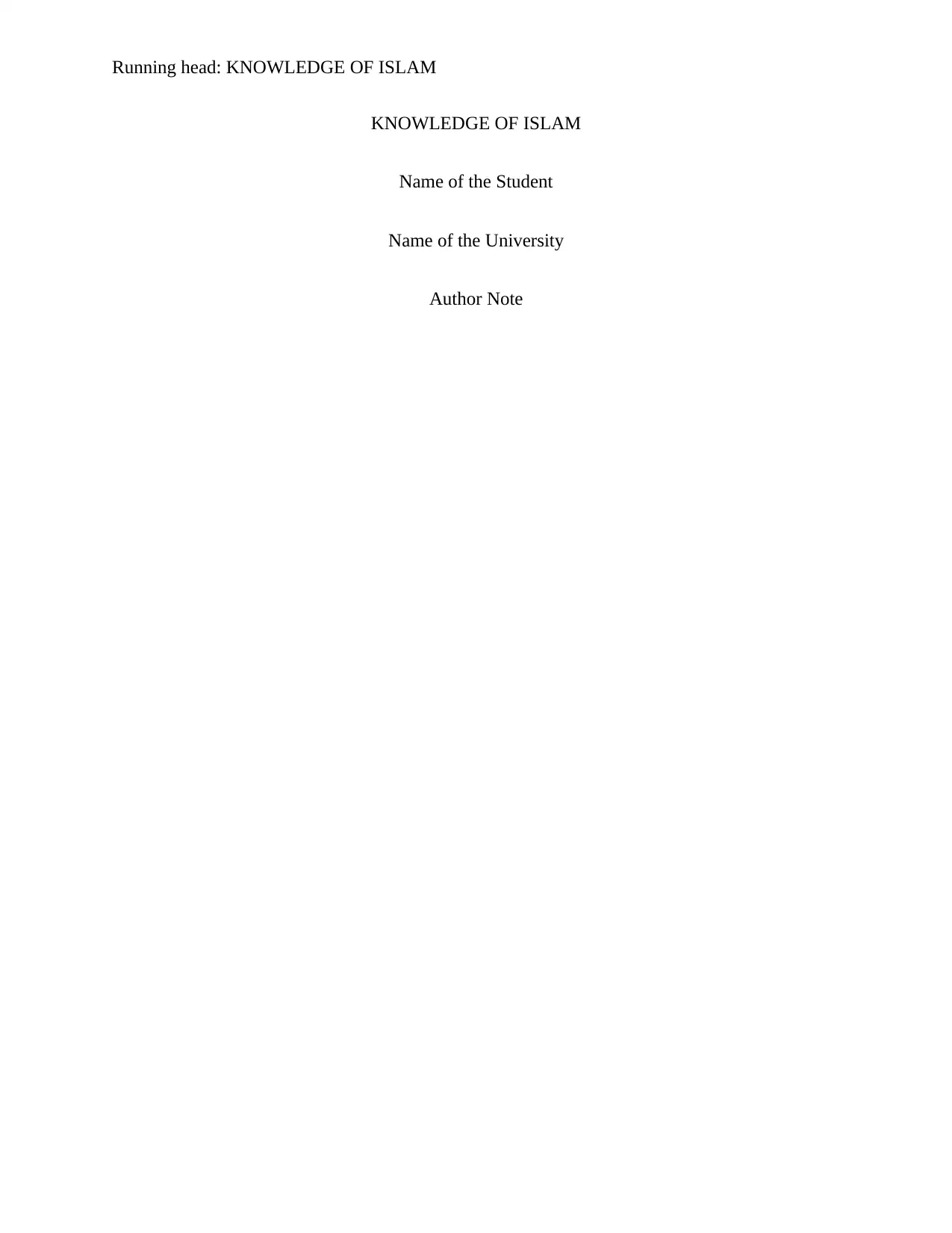
Running head: KNOWLEDGE OF ISLAM
KNOWLEDGE OF ISLAM
Name of the Student
Name of the University
Author Note
KNOWLEDGE OF ISLAM
Name of the Student
Name of the University
Author Note
Paraphrase This Document
Need a fresh take? Get an instant paraphrase of this document with our AI Paraphraser
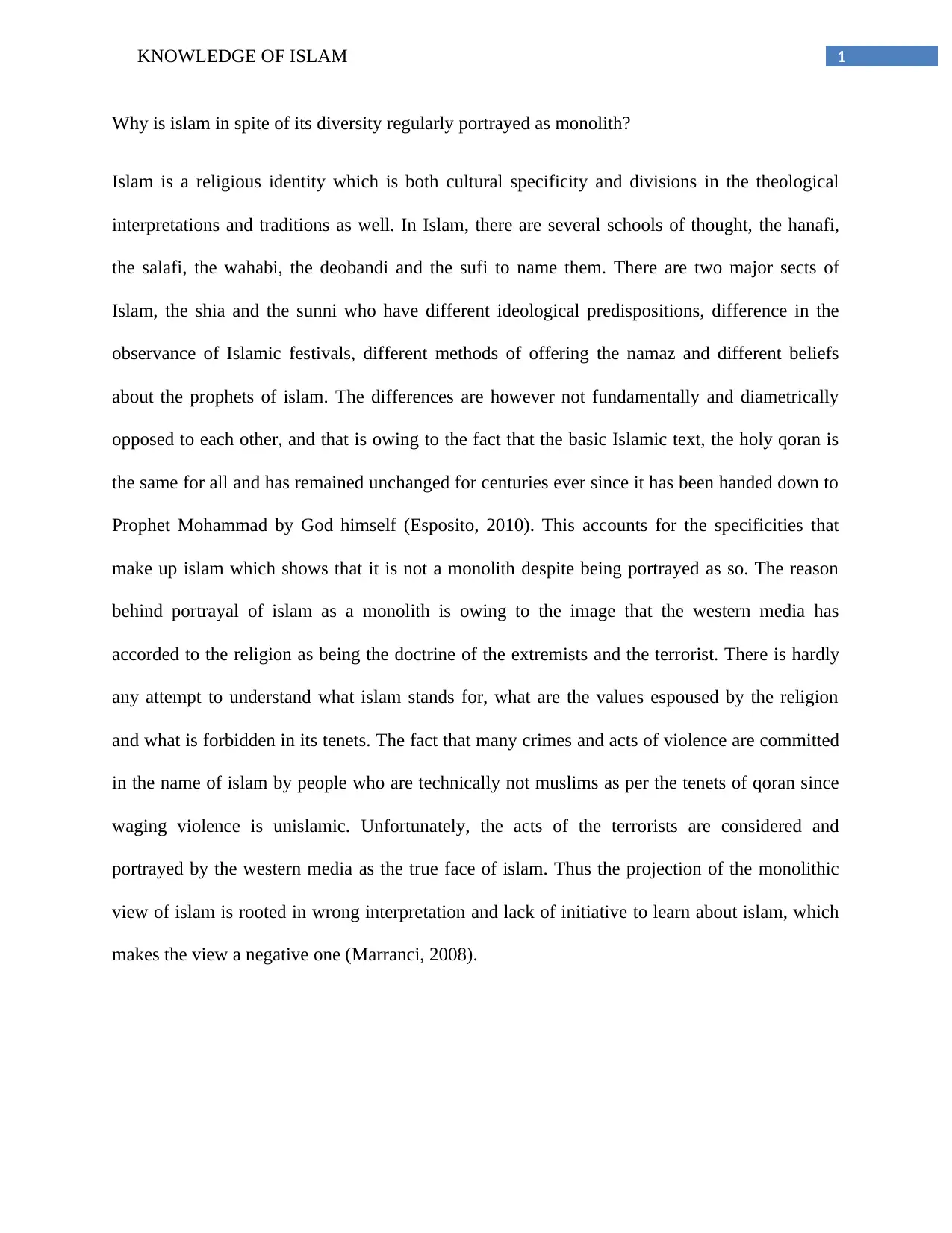
1KNOWLEDGE OF ISLAM
Why is islam in spite of its diversity regularly portrayed as monolith?
Islam is a religious identity which is both cultural specificity and divisions in the theological
interpretations and traditions as well. In Islam, there are several schools of thought, the hanafi,
the salafi, the wahabi, the deobandi and the sufi to name them. There are two major sects of
Islam, the shia and the sunni who have different ideological predispositions, difference in the
observance of Islamic festivals, different methods of offering the namaz and different beliefs
about the prophets of islam. The differences are however not fundamentally and diametrically
opposed to each other, and that is owing to the fact that the basic Islamic text, the holy qoran is
the same for all and has remained unchanged for centuries ever since it has been handed down to
Prophet Mohammad by God himself (Esposito, 2010). This accounts for the specificities that
make up islam which shows that it is not a monolith despite being portrayed as so. The reason
behind portrayal of islam as a monolith is owing to the image that the western media has
accorded to the religion as being the doctrine of the extremists and the terrorist. There is hardly
any attempt to understand what islam stands for, what are the values espoused by the religion
and what is forbidden in its tenets. The fact that many crimes and acts of violence are committed
in the name of islam by people who are technically not muslims as per the tenets of qoran since
waging violence is unislamic. Unfortunately, the acts of the terrorists are considered and
portrayed by the western media as the true face of islam. Thus the projection of the monolithic
view of islam is rooted in wrong interpretation and lack of initiative to learn about islam, which
makes the view a negative one (Marranci, 2008).
Why is islam in spite of its diversity regularly portrayed as monolith?
Islam is a religious identity which is both cultural specificity and divisions in the theological
interpretations and traditions as well. In Islam, there are several schools of thought, the hanafi,
the salafi, the wahabi, the deobandi and the sufi to name them. There are two major sects of
Islam, the shia and the sunni who have different ideological predispositions, difference in the
observance of Islamic festivals, different methods of offering the namaz and different beliefs
about the prophets of islam. The differences are however not fundamentally and diametrically
opposed to each other, and that is owing to the fact that the basic Islamic text, the holy qoran is
the same for all and has remained unchanged for centuries ever since it has been handed down to
Prophet Mohammad by God himself (Esposito, 2010). This accounts for the specificities that
make up islam which shows that it is not a monolith despite being portrayed as so. The reason
behind portrayal of islam as a monolith is owing to the image that the western media has
accorded to the religion as being the doctrine of the extremists and the terrorist. There is hardly
any attempt to understand what islam stands for, what are the values espoused by the religion
and what is forbidden in its tenets. The fact that many crimes and acts of violence are committed
in the name of islam by people who are technically not muslims as per the tenets of qoran since
waging violence is unislamic. Unfortunately, the acts of the terrorists are considered and
portrayed by the western media as the true face of islam. Thus the projection of the monolithic
view of islam is rooted in wrong interpretation and lack of initiative to learn about islam, which
makes the view a negative one (Marranci, 2008).
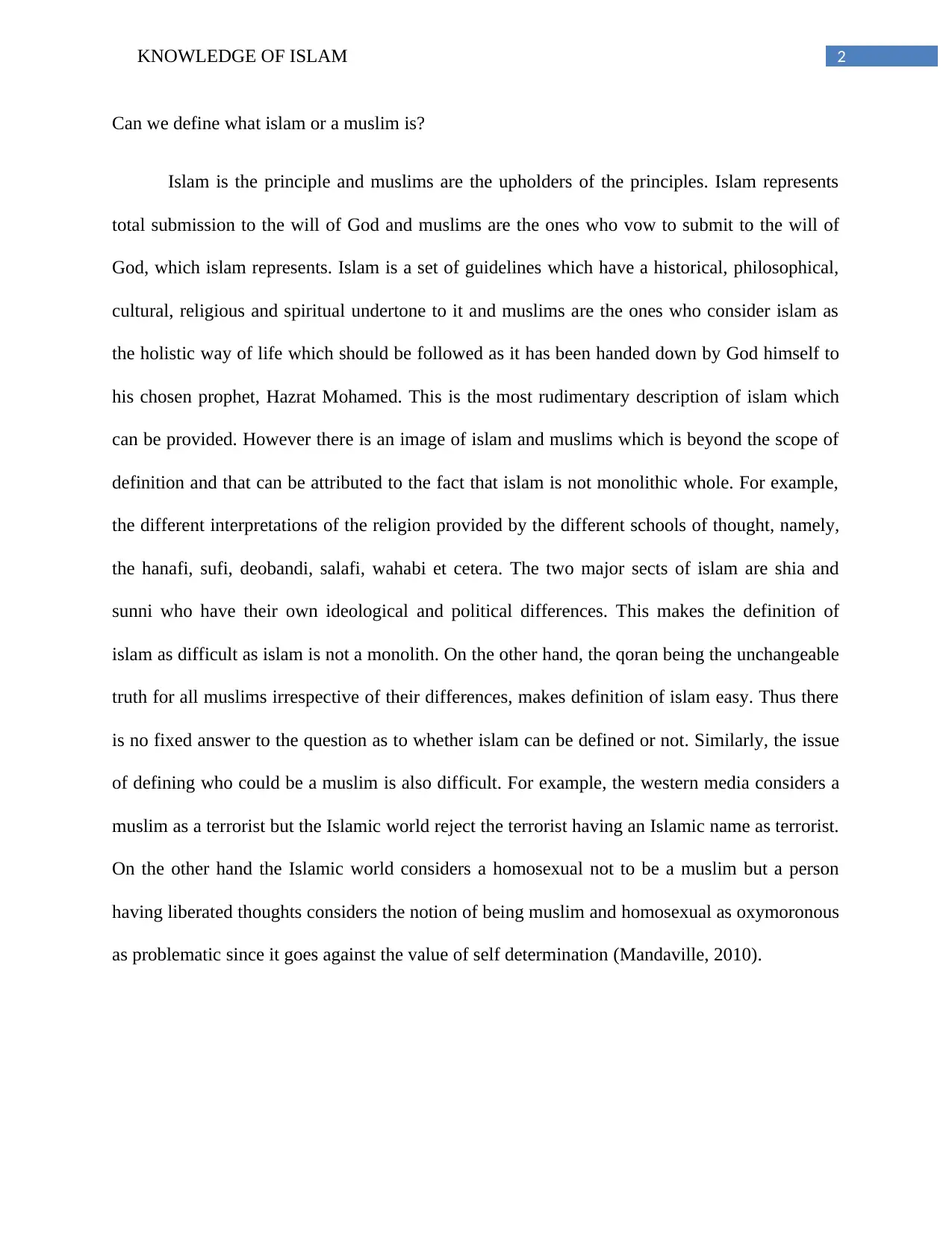
2KNOWLEDGE OF ISLAM
Can we define what islam or a muslim is?
Islam is the principle and muslims are the upholders of the principles. Islam represents
total submission to the will of God and muslims are the ones who vow to submit to the will of
God, which islam represents. Islam is a set of guidelines which have a historical, philosophical,
cultural, religious and spiritual undertone to it and muslims are the ones who consider islam as
the holistic way of life which should be followed as it has been handed down by God himself to
his chosen prophet, Hazrat Mohamed. This is the most rudimentary description of islam which
can be provided. However there is an image of islam and muslims which is beyond the scope of
definition and that can be attributed to the fact that islam is not monolithic whole. For example,
the different interpretations of the religion provided by the different schools of thought, namely,
the hanafi, sufi, deobandi, salafi, wahabi et cetera. The two major sects of islam are shia and
sunni who have their own ideological and political differences. This makes the definition of
islam as difficult as islam is not a monolith. On the other hand, the qoran being the unchangeable
truth for all muslims irrespective of their differences, makes definition of islam easy. Thus there
is no fixed answer to the question as to whether islam can be defined or not. Similarly, the issue
of defining who could be a muslim is also difficult. For example, the western media considers a
muslim as a terrorist but the Islamic world reject the terrorist having an Islamic name as terrorist.
On the other hand the Islamic world considers a homosexual not to be a muslim but a person
having liberated thoughts considers the notion of being muslim and homosexual as oxymoronous
as problematic since it goes against the value of self determination (Mandaville, 2010).
Can we define what islam or a muslim is?
Islam is the principle and muslims are the upholders of the principles. Islam represents
total submission to the will of God and muslims are the ones who vow to submit to the will of
God, which islam represents. Islam is a set of guidelines which have a historical, philosophical,
cultural, religious and spiritual undertone to it and muslims are the ones who consider islam as
the holistic way of life which should be followed as it has been handed down by God himself to
his chosen prophet, Hazrat Mohamed. This is the most rudimentary description of islam which
can be provided. However there is an image of islam and muslims which is beyond the scope of
definition and that can be attributed to the fact that islam is not monolithic whole. For example,
the different interpretations of the religion provided by the different schools of thought, namely,
the hanafi, sufi, deobandi, salafi, wahabi et cetera. The two major sects of islam are shia and
sunni who have their own ideological and political differences. This makes the definition of
islam as difficult as islam is not a monolith. On the other hand, the qoran being the unchangeable
truth for all muslims irrespective of their differences, makes definition of islam easy. Thus there
is no fixed answer to the question as to whether islam can be defined or not. Similarly, the issue
of defining who could be a muslim is also difficult. For example, the western media considers a
muslim as a terrorist but the Islamic world reject the terrorist having an Islamic name as terrorist.
On the other hand the Islamic world considers a homosexual not to be a muslim but a person
having liberated thoughts considers the notion of being muslim and homosexual as oxymoronous
as problematic since it goes against the value of self determination (Mandaville, 2010).
⊘ This is a preview!⊘
Do you want full access?
Subscribe today to unlock all pages.

Trusted by 1+ million students worldwide
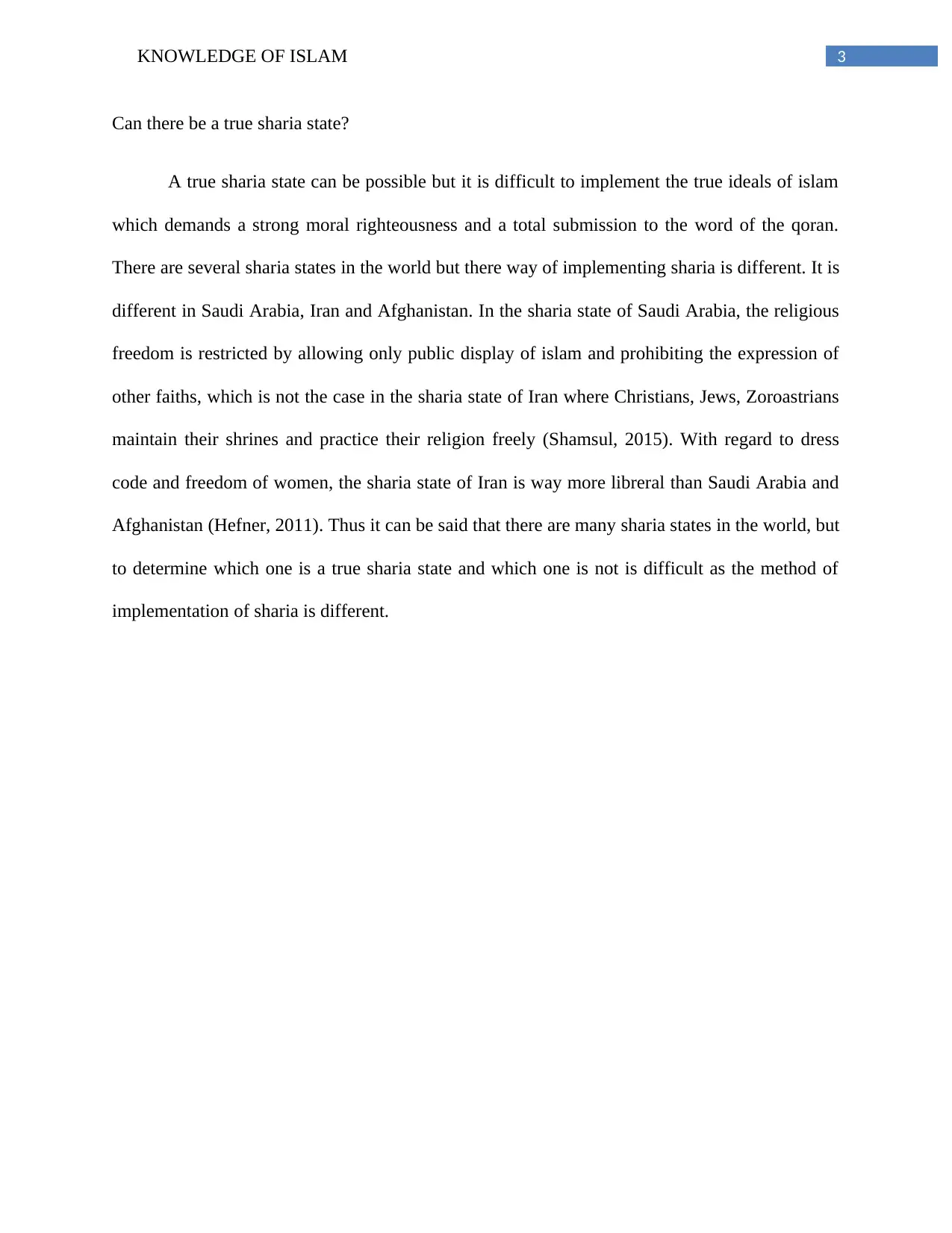
3KNOWLEDGE OF ISLAM
Can there be a true sharia state?
A true sharia state can be possible but it is difficult to implement the true ideals of islam
which demands a strong moral righteousness and a total submission to the word of the qoran.
There are several sharia states in the world but there way of implementing sharia is different. It is
different in Saudi Arabia, Iran and Afghanistan. In the sharia state of Saudi Arabia, the religious
freedom is restricted by allowing only public display of islam and prohibiting the expression of
other faiths, which is not the case in the sharia state of Iran where Christians, Jews, Zoroastrians
maintain their shrines and practice their religion freely (Shamsul, 2015). With regard to dress
code and freedom of women, the sharia state of Iran is way more libreral than Saudi Arabia and
Afghanistan (Hefner, 2011). Thus it can be said that there are many sharia states in the world, but
to determine which one is a true sharia state and which one is not is difficult as the method of
implementation of sharia is different.
Can there be a true sharia state?
A true sharia state can be possible but it is difficult to implement the true ideals of islam
which demands a strong moral righteousness and a total submission to the word of the qoran.
There are several sharia states in the world but there way of implementing sharia is different. It is
different in Saudi Arabia, Iran and Afghanistan. In the sharia state of Saudi Arabia, the religious
freedom is restricted by allowing only public display of islam and prohibiting the expression of
other faiths, which is not the case in the sharia state of Iran where Christians, Jews, Zoroastrians
maintain their shrines and practice their religion freely (Shamsul, 2015). With regard to dress
code and freedom of women, the sharia state of Iran is way more libreral than Saudi Arabia and
Afghanistan (Hefner, 2011). Thus it can be said that there are many sharia states in the world, but
to determine which one is a true sharia state and which one is not is difficult as the method of
implementation of sharia is different.
Paraphrase This Document
Need a fresh take? Get an instant paraphrase of this document with our AI Paraphraser
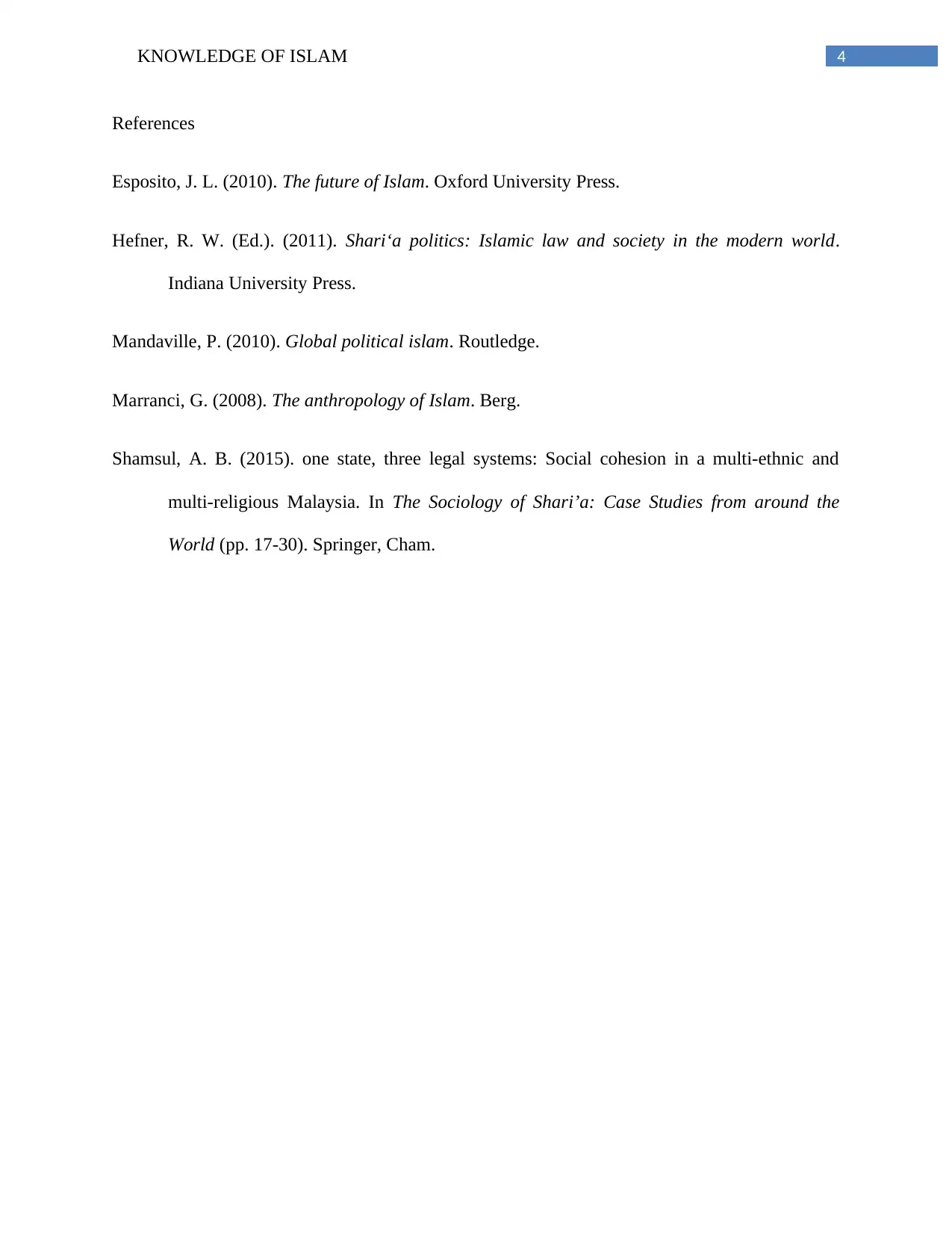
4KNOWLEDGE OF ISLAM
References
Esposito, J. L. (2010). The future of Islam. Oxford University Press.
Hefner, R. W. (Ed.). (2011). Shariʻa politics: Islamic law and society in the modern world.
Indiana University Press.
Mandaville, P. (2010). Global political islam. Routledge.
Marranci, G. (2008). The anthropology of Islam. Berg.
Shamsul, A. B. (2015). one state, three legal systems: Social cohesion in a multi-ethnic and
multi-religious Malaysia. In The Sociology of Shari’a: Case Studies from around the
World (pp. 17-30). Springer, Cham.
References
Esposito, J. L. (2010). The future of Islam. Oxford University Press.
Hefner, R. W. (Ed.). (2011). Shariʻa politics: Islamic law and society in the modern world.
Indiana University Press.
Mandaville, P. (2010). Global political islam. Routledge.
Marranci, G. (2008). The anthropology of Islam. Berg.
Shamsul, A. B. (2015). one state, three legal systems: Social cohesion in a multi-ethnic and
multi-religious Malaysia. In The Sociology of Shari’a: Case Studies from around the
World (pp. 17-30). Springer, Cham.
1 out of 5
Related Documents
Your All-in-One AI-Powered Toolkit for Academic Success.
+13062052269
info@desklib.com
Available 24*7 on WhatsApp / Email
![[object Object]](/_next/static/media/star-bottom.7253800d.svg)
Unlock your academic potential
Copyright © 2020–2025 A2Z Services. All Rights Reserved. Developed and managed by ZUCOL.





